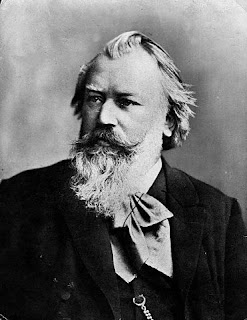Information
Composer: Johannes Brahms
- Ein deutsches Requiem, Op. 45: I. Selig sind, die da Leid tragen
- Ein deutsches Requiem, Op. 45: II. Denn alles Fleisch, es ist wie Gras
- Ein deutsches Requiem, Op. 45: III. Herr, lehre doch mich
- Ein deutsches Requiem, Op. 45: IV. Wie lieblich sind deine Wohnungen
- Ein deutsches Requiem, Op. 45: V. Ihr habt nun Traurigkeit
- Ein deutsches Requiem, Op. 45: VI. Denn wir haben hie keine bleibende Statt
- Ein deutsches Requiem, Op. 45: VII. Selig sind die Toten
Elisabeth Schwarzkopf, soprano
Dietrich Fischer-Dieskau, baritone
Philharmonia Chorus
Philharmonia Orchestra
Otto Klemperer, conductor
Date: 1961
Label: EMI
----------------------------------------------------------------------------
Review
It doesn't take long, listening to this recording of Brahms' Ein deutsches Requiem with Otto Klemperer leading the Philharmonia Orchestra and Chorus, to understand its iconic status as one of the outstanding recordings of the work. In the opening measures of the first movement, "Selig sind, die da Leid tragen," Klemperer creates an ethereally transparent texture that blossoms throughout the movement into a mood of luminous serenity. That quality is even more pronounced in the transcendent tranquility of the fourth movement, "Wie Lieblich sind deine Wohnungen." In the second movement, "Den alles Fleisch, es ist wie Gras," Klemperer cuts loose in the build up to the apocalyptic second choral statement of the theme, which has an overwhelmingly ominous power, a power that he summons again in the forceful sixth movement, "Denn wir haben keine bleibende Stadt." Klemperer handles the composers' tricky tempos shifts with complete assurance, so that they seem entirely inevitable. Throughout, Klemperer demonstrates his profound understanding of the musical and emotional richness and complexity of Brahms' masterpiece. The orchestra and chorus respond to his leadership with complete attentiveness and deliver nuanced and passionate performances. Baritone Dietrich Fischer-Dieskau's investment in the music is evident in his warm tone, shapely phrasing, and the dramatic urgency of his performance. Soprano Elizabeth Schwartzkopf's voice did not have all the bloom and flexibility of its prime, but she brings a floating lightness to her solo, "Ihr habt nun Traurigkeit." Produced by Walter Legge and engineered by Douglas Larter, the recording was state-of- the-art when it was recorded in 1961, and the 1997 digital remastering brings it to a standard that should satisfy most listeners. The sound is transparent in the quieter moments, and round and rich in the fuller sections, and always clear and clean. This recording is a must-have for fans of Brahms' Requiem and of outstanding choral performances.
-- Stephen Eddins, AllMusicMore reviews:
https://www.gramophone.co.uk/editorial/brahmss-ein-deutsches-requiem-a-german-requiem
http://www.flyinginkpot.com/1999/07/inkpot83-classical-music-reviews-requiem-cycle-brahms-ein-deutsches-requiem-schwarzkopffischer-dieskauphilharmoniaklemperer-emi/
http://www.amazon.com/Brahms-Deutsches-Requiem-Recordings-Century/dp/B00000GCA3
----------------------------------------------------------------------------
Johannes Brahms (7 May 1833 – 3 April 1897) was a German composer and pianist. In his lifetime, Brahms's popularity and influence were considerable. Brahms composed for symphony orchestra, chamber ensembles, piano, organ, and voice and chorus. Many of his works have become staples of the modern concert repertoire. An uncompromising perfectionist, Brahms destroyed some of his works and left others unpublished. Brahms is often considered both a traditionalist and an innovator. His music is firmly rooted in the structures and compositional techniques of the Classical masters, with a highly romantic nature embedded within.
https://en.wikipedia.org/wiki/Johannes_Brahms
https://en.wikipedia.org/wiki/Johannes_Brahms
***
Otto Klemperer (14 May 1885 – 6 July 1973) was a German conductor and composer. He is widely regarded as one of the leading conductors of the 20th century. Klemperer met Gustav Mahler while conducting the off-stage brass at a performance of Mahler's Symphony No. 2, and later assisted Mahler in the premiere of Mahler's Symphony No. 8. He became the first principal conductor of the Philharmonia in 1959, subsequently made many recordings for EMI that have become classics. While adopting slower tempi as he aged, Klemperer's performances often maintain great intensity, and are richly detailed.
http://en.wikipedia.org/wiki/Otto_Klemperer
http://en.wikipedia.org/wiki/Otto_Klemperer
----------------------------------------------------------------------------
FLAC, tracks
Links in comment
Enjoy!




This comment has been removed by the author.
ReplyDeleteCopy Adfly (adf.ly/XXXXXX) or LinkShrink (linkshrink.net/XXXXXX) to your browser's address bar, wait 5 seconds, then click on 'Skip [This] Ad' (or 'Continue') (yellow button, top right).
ReplyDeleteIf Adfly or LinkShrink ask you to download anything, IGNORE them, only download from file hosting site (mega.nz).
If you encounter 'Bandwidth Limit Exceeded' problem, try to create a free account on MEGA.
MEGA
http://adf.ly/1MqgBz
¡Muchas gracias, Ronald Do!
ReplyDelete